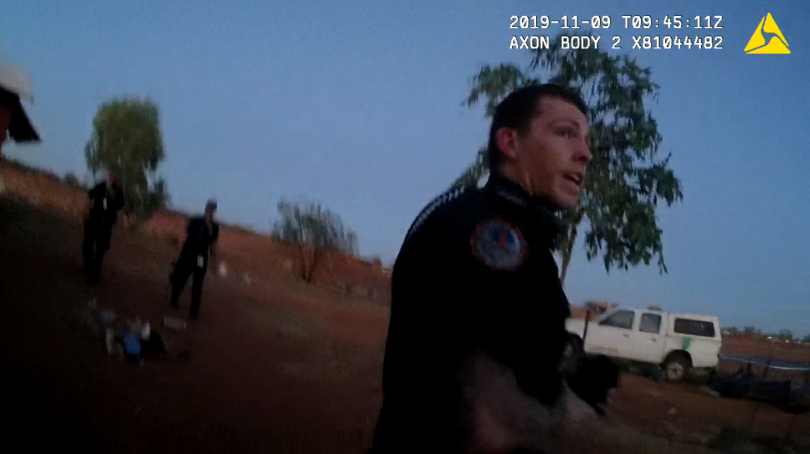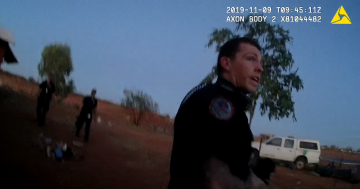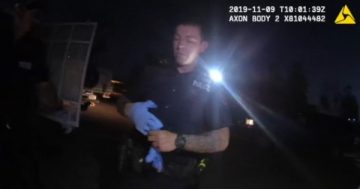
Constable Zachary Rolfe before the shooting. The body-cam footage has been tendered to the court. Image: Supplied
Readers are advised this article contains content some may find distressing.
A police trainer has said Constable Zachary Rolfe put himself in danger when entering the house where he fired on Kumanjayi Walker and that it was not reasonable to shoot him the second or third time.
Mr Rolfe, 30, is currently facing a jury trial in the Northern Territory Supreme Court. He is accused of murdering the 19-year-old Indigenous Australian man in the small desert community of Yuendumu, outside Alice Springs, on 9 November 2019.
Jurors previously heard he and a fellow member of the immediate response team, Remote Sergeant Adam Eberl, were looking for Mr Walker that evening when they found him inside a house in the community.
Mr Walker allegedly stabbed Mr Rolfe in the shoulder with a pair of scissors and Mr Rolfe shot him once, then Mr Walker and Sergeant Eberl got into a struggle. Mr Rolfe then allegedly fired two shots into him.
Detective Senior Sergeant Andrew Barram, a 25-year veteran of the NT Police who headed a section of recruit training at the police college, testified on Monday and Tuesday (28 February and 1 March). He said he believed Mr Rolfe was justified when he fired the first shot.
“He was confronted at close range with an edged weapon, was actually stabbed with it in his shoulder, and it would have been reasonable to believe that his partner was also, at that point, in danger,” he said.
However, he said it was not reasonable or necessary to fire the second or third shots “because things had changed substantially from when the first shot was fired”.
“They’d gone from a standing position in a fairly equal fight to being on the ground, with Constable Eberl on top and pinning Mr Walker down,” Detective Sergeant Barram said.
He said Mr Rolfe could have helped his partner take control of Mr Walker while they were on the ground.
It was his opinion that after the so-called ‘axe incident’ on 6 November 2019, where Mr Walker brandished a hatchet at two police officers, Mr Walker was a high-risk arrest target.
Crown Prosecutor Philip Strickland SC said there had been no discussion between Mr Rolfe and Sergeant Eberl about what they would do if they found Mr Walker in the house before they entered it. When asked, Detective Sergeant Barram said, “there was no urgency for them to go into that house at all”.
“They had all the time in the world to discuss, plan, make some decisions about what would happen, utilise their if/then thinking and training, about if he is in there, what do we do,” he said.
He said it did not appear Mr Rolfe or Sergeant Eberl followed their training when they went into the house.
For instance, from viewing body-worn camera footage shown to the court, the first time Mr Walker was seen was when he had his hand in his pocket.
“If you’ve got someone that you even suspect may be armed, the first thing you’re going to want to do is see their hands. So I don’t know why they persisted with going in,” Detective Sergeant Barram said.
“They could have done that from the door and said ‘show me your hands’ immediately.”
He said standing at the door would have provided them with time, distance and cover, rather than going into a room with a potentially armed offender, and that the two police officers had put themselves in danger.
“They’ve put themselves in close proximity to someone that they suspect was armed,” he said.
During cross-examination, Mr Rolfe’s barrister David Edwardson QC said Mr Walker presented the scissors in a “split-second”. Detective Sergeant Barram accepted such implements could be a lethal weapon and Mr Rolfe had to quickly respond instinctively and intuitively to a dangerous situation.
He also accepted that even if an offender was underneath a police officer, their roles could be reversed in seconds.
Mr Rolfe has pleaded not guilty to a charge of murder, as well as alternative charges of manslaughter and committing a violent act causing death.
The cross-examination of Detective Sergeant Barram will continue on Wednesday (2 March). The trial continues before Justice John Burns.














